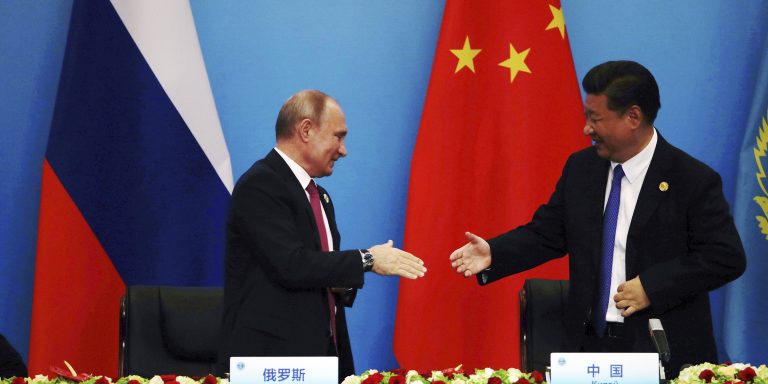INTELBRIEF
June 15, 2018
IntelBrief: The Two-Sided Coin of the Shanghai Cooperation Organization Qingdao Summit

- On June 10 and 11, the Shanghai Cooperation Organization’s (SCO) 18thSummit took place in the eastern city of Qingdao, China.
- In contrast to the G7 summit, SCO presented an image of responsible, inclusive, and cooperative global governance.
- Beijing’s actions and rhetoric during the summit confirm China’s increasing assertiveness internationally and willingness to take on a regional leadership role.
- The counterterrorism policies coming out of the Qingdao summit make clear that the SCO still consists mainly of authoritarian states concerned with ensuring their own power.
.
During a time when Western-led institutions are faltering, the Shanghai Cooperation Organization (SCO) presents a united front, dedicated to global governance, cooperation, and inclusiveness. The SCO was founded in 2001 in order to ensure common security and economic prosperity. On June 10 and 11, SCO held its 18thSummit in the Chinese city of Qingdao, in which long-term rivals India and Pakistan participated as full members for the first time. SCO’s expansion of membership, now totaling eight states, makes it the largest regional body in terms of population, incorporating over 3 billion people. While the United States practices an ‘America First’ policy, and Western-led institutions are wavering--evidenced during the most recent G7 summit--SCO member states present a united front. The regional body unanimously agreed to uphold WTO rules and bring peace to the Korean peninsula through dialogue and consultation and stressed the importance of all members of the Iran nuclear deal to uphold their obligations in order to ensure sustainable implementation.
China is the true winner of the SCO’s Qingdao Summit. In a world where China is increasingly asserting its leadership role, in particular when it comes to regional cooperation and economic integration as materialized in the Belt and Road Initiative, Beijing’s leadership in the SCO stands in stark contrast to that of Donald Trump at the G7 summit. Chinese-led initiatives dominated the Qingdao summit, including setting up an RMB 30 billion ($4.6 billion) special lending facility for SCO members and offering to train over 2,000 law enforcement personnel in counterterrorism tactics. As countries in the West, especially the United States, is taking a step down from global governance, China is ready to step up.
Still, the new counterterrorism policies put forth by the Qingdao Summit reinforce concerns that member states use terrorism as a front to crack down on political opposition. Historically, the SCO and its member states, especially China and the Central Asian countries, have been criticized for exercising political oppression in the name of combating terrorism. An example is China’s ‘assimilation’ policies towards the Uighurs, a Muslim minority living in China’s Western Xinjiang province, which includes religious re-education camps and a ban on the name Muhammad.
One of the new SCO policies facilities easier extraditions of terrorists between member states. Such a policy is disturbing when considered in the context of human rights. It effectively means a member state, like China, can demand extradition based on terrorism charges of Uighurs currently living in Central Asia. The broad definition of terrorism used by SCO—which includes separatism and religious extremism—enables China to target Uighurs who have fled abroad to avoid political persecution.
In addition, the SCO’s counterterrorism policy is exclusively focused on hard-power: military, law enforcement and intelligence. Although important, it can also be seen as firefighting instead of addressing the root causes of radicalization in Central Asia. It would be more strategic if the SCO focused on building resilience in the communities most vulnerable to radicalization, such as the area of the Fergana Valley in Uzbekistan, Kyrgyzstan, and Tajikistan. Such steps would also signal to the rest of the world that SCO members are legitimately concerned with addressing the growing threat of terrorism in the region, rather than using it as a pretext to settle scores with political opponents. Still, the counterterrorism policies coming out of the Qingdao summit make clear that the SCO still consists mainly of authoritarian states concerned with ensuring their own power, no matter how eager they are to project an image of responsible regional leadership in Eurasia.
.
For tailored research and analysis, please contact: info@thesoufancenter.org
[video width="960" height="540" mp4="https://thesoufancenter.org/wp-content/uploads/2018/06/Final-Edit-1-216.mp4" poster="https://thesoufancenter.org/wp-content/uploads/2018/06/AP_18161303970771.jpg"][/video]